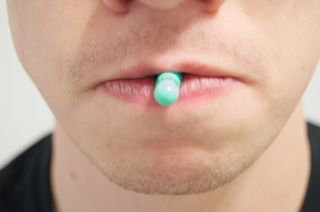
To Understand Placebo, First Take It Out Of Medicine's Black Box (Op-Ed)

This article was originally published at The Conversation. The publication contributed the article to LiveScience's Expert Voices: Op-Ed & Insights.
Placebos have a longer history than medicine as we know it, and have a huge effect on all kinds of diseases and health conditions. But it may now be time to rethink their role.
The placebo made its debut in the medical literature some 200 years ago, although the administration of inert agents in medical practice has a considerably longer history. In fact, such practice is probably as old as medicine itself.
Placebos took on a more studied role with the increasing application of the scientific method to health care that really took off around the middle of the last century. In this context, placebo interventions have been used as a control to test the efficacy of certain treatments.
What is it anyway?
Recently, the increasing incorporation of best-available scientific evidence into medical care (evidence-based practice) has sparked debate around placebos.
Most often, these debates centre on whether a particular treatment works only via placebo, and what implications this might have for policy-makers, clinicians, and patients.
Unsurprisingly, there’s also significant ethical controversy concerning the practice of clinicians knowingly providing inert treatments (placebos) to their patients.
Sign up for the Live Science daily newsletter now
Get the world’s most fascinating discoveries delivered straight to your inbox.
But two important considerations are sometimes lost in the midst of these debates. The first is the question of just how powerful the placebo effect really is; that is, how much benefit do patients actually gain due to the administration of placebo intervention?
This issue is far from resolved, with the answer lying somewhere between “bugger-all” and “quite a lot”.
The second issue is possibly of even greater significance. It concerns the theoretical underpinning of placebos and placebo effects themselves.
Why we need to understand
Attempts to try and define placebos and placebo effects have a chequered history. The short version of the story is that no one has been able to propose a definition palatable to the bulk of the players in the field.
The problem with coming to an agreed definition stems from a logical paradox – how can an inert agent (a placebo intervention) have a real effect (a placebo effect)?
Some researchers have tried to overcome this problem by introducing terms such as “non-specific” or “contextual” to the placebo definition, but all of these require that the placebo itself is no longer inert.

This leads to questions about what is and isn’t a placebo, and blurs the lines between placebo interventions and “real” interventions.
Currently, the placebo exists as a kind of mysterious black box that sits between administration of a treatment that doesn’t work the way we think it should, and a beneficial effect for a patient. So what purpose does this black box serve?
If there is an effect (the patient gets better), then seeking the reason or cause of this effect would seem useful.
This work has already begun; the two most promising lines of research investigate how patients' expectations affect their outcome, and explore the role of classical conditioning in the placebo effect.
Rethinking placebo
There’s also research seeking to better understand the effect of manipulating the context of treatment and features of the patient-practitioner interaction – factors that often fall under the cloak of the placebo. These might include empathy shown by the practitioner, the connection or bond patients feel and the beliefs of the practitioner regarding the patient or condition.
Considering these factors as effective treatment components in their own right offers a way to understand how interventions work and, potentially, an insight into the nature of the condition being treated.
Improving understanding of how treatments work, and what features of the clinical context influence outcome has self-evident advantages for clinicians and their patients. And reconceptualising the outdated notion of an inert placebo can help resolve some of the ethical issues surrounding its use.
From a research perspective, hanging onto the placebo idea also appears to serve little purpose. Simply designating a control intervention as a “placebo” tells us nothing about what the control intervention actually controls for.
A number of different interventions may all be called placebos, and all of them may control for different aspects of the intervention being tested.
Dispensing with the idea of a placebo arm in clinical trials could have the benefit of forcing trial designers to more carefully consider and define what they seek to control for, and assist interpretation of clinical trials.
The placebo effect emerged and gained prominence in an era when health care was moving from a semi-mystical past toward the scientific present.
Over this time, numerous treatments have been abandoned as understanding of biology, anatomy and pathology improved. It’s possible the current concept of placebo, which served as a useful tool in the past, has reached its use-by date.
Steve Kamper receives funding from The National Health and Medical Research Council of Australia.
This article was originally published at The Conversation. Read the original article. The views expressed are those of the author and do not necessarily reflect the views of the publisher. This version of the article was originally published on LiveScience.












